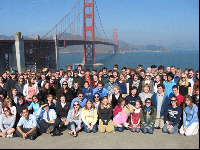You reached this page through the archive. Click here to return to the archive.
Note: This article is over a year old and information contained in it may no longer be accurate. Please use the contact information in the lower-left corner to verify any information in this article.
Students go 'green' on music tours
March 11, 2009
St. Olaf students know what it means to live a "green" lifestyle on the Hill. They turn off the lights when they leave a room, buy environmentally friendly notebooks for their classes and eat in a cafeteria committed to serving locally grown food. Members of the college's music ensembles are now taking that commitment to sustainability on the road.
 |
| During their 2009 tour through California, which included a visit to the Golden Gate Bridge, members of the St. Olaf Band made efforts to be sustainable while on the road. |
Perhaps the Eco Crew's biggest initiative this year was the goal of creating a "carbon neutral" tour. Using a carbon calculator, Fulton discovered that the total carbon emissions for the band tour this year amounted to 66.6 metric tons of carbon. To offset that total, the Eco Crew requested donations from band members that will ultimately go to local agricultural carbon offset initiatives. The band plans to work with Northfield-area farmers who practice no-till farming, which is the process of leaving corn stalks in the soil after harvest rather than turning it over and releasing carbon back into the atmosphere.
"A farmer in Northfield who practices no-till farming is allowing his or her soil to naturally capture and hold carbon. In our area, about 0.6 metric tons of carbon are sequestered per acre, per year," Fulton explains, noting that tilling a field releases the carbon that has been absorbed over the course of the growing season back into the atmosphere. "So a farmer with 100 acres of no-till farm land can sequester 60 metric tons of carbon per year. That gives the farmer 60 tons of carbon credit." The Eco Crew will be using the money donated by band members to purchase those carbon credits from local farmers to offset the carbon the band emitted while on tour.
A much simpler, yet effective, way that band members worked to reduce their carbon footprint was making changes to everything from the snacks they ate on the bus to the length of their showers. It's a tradition among all three touring ensembles to purchase "bus treats" for each other when fellow ensembles hit the road. In the past these snacks have included things like store-bought cookies, chips and candy. This year, however, the band and orchestra baked cookies for each other and the choir to take along, thus eliminating a significant amount of plastic packaging.
The band also added a recycling bag to their tour buses alongside the normal garbage bag. The Eco-Crew encouraged band members to think about simple ways they reduce their energy use at school and to bring those ideas along on tour, including suggesting that they bring their own reusable water bottles and take shorter, cooler showers. "These actions to help reduce greenhouse gas emissions aren't only done by scientists or 'hippies,'" Fulton says. "They can be done by a bunch of college kids -- a bunch of musicians."
In addition to encouraging sustainability among band members, the Eco Crew is looking for other ways the ensemble can reduce its environmental impact in the future. Some possibilities include attempting to limit the number of programs printed for each tour and purchasing the annual tour T-shirts from an American supplier.
